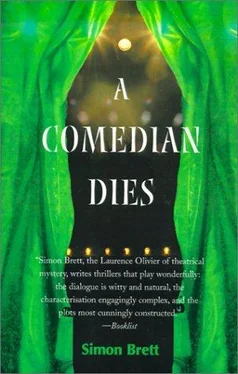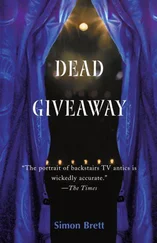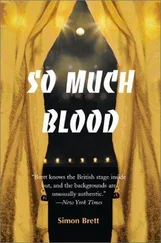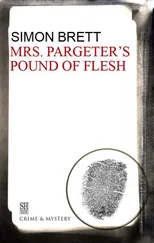Simon Brett - A Comedian Dies
Здесь есть возможность читать онлайн «Simon Brett - A Comedian Dies» весь текст электронной книги совершенно бесплатно (целиком полную версию без сокращений). В некоторых случаях можно слушать аудио, скачать через торрент в формате fb2 и присутствует краткое содержание. Жанр: Классический детектив, на английском языке. Описание произведения, (предисловие) а так же отзывы посетителей доступны на портале библиотеки ЛибКат.
- Название:A Comedian Dies
- Автор:
- Жанр:
- Год:неизвестен
- ISBN:нет данных
- Рейтинг книги:5 / 5. Голосов: 1
-
Избранное:Добавить в избранное
- Отзывы:
-
Ваша оценка:
- 100
- 1
- 2
- 3
- 4
- 5
A Comedian Dies: краткое содержание, описание и аннотация
Предлагаем к чтению аннотацию, описание, краткое содержание или предисловие (зависит от того, что написал сам автор книги «A Comedian Dies»). Если вы не нашли необходимую информацию о книге — напишите в комментариях, мы постараемся отыскать её.
A Comedian Dies — читать онлайн бесплатно полную книгу (весь текст) целиком
Ниже представлен текст книги, разбитый по страницам. Система сохранения места последней прочитанной страницы, позволяет с удобством читать онлайн бесплатно книгу «A Comedian Dies», без необходимости каждый раз заново искать на чём Вы остановились. Поставьте закладку, и сможете в любой момент перейти на страницу, на которой закончили чтение.
Интервал:
Закладка:
‘Just the day before the recording. But Walter Proud’s taking me out to lunch today to meet Lennie Barber.’
‘I thought Walter was with the BBC. The Alexander Harvey Show ’s the other side, isn’t it?’
‘Yes, Walter’s freelance now. Sort of throwing ideas around to all the companies.’
‘I see. Thought he was rather well placed at the BBC.’
‘Yes, but he left. I don’t know, reading between the lines, I think there may have been some sort of row.’
‘Hmm. Anyway, you’ll get a better lunch on ITV expenses. Where’s he taking you?’
‘Restaurant called Great Expectations.’
‘I hope they’re realized. Let me know when you get anywhere on the murder.’
Great Expectations had recently opened in that Notting Hill area which is so convenient for lunching from BBC Television Centre. It was a concept restaurant, themed wittily around the works of Dickens. A bust of the author greeted patrons outside the door and inside the walls were covered with prints from his novels. The motif was carried through to the table-mats and napkins; menu and wine list were held in leather folders like first editions. The waiters and waitresses looked as though they had escaped from the chorus of Oliver!
This High Camp had also invaded the food. Instead of being called sensible things like Tomato Soup or Steak and Kidney Pie, the dishes rejoiced in such titles as Sairey Gamp’s Strengthening Broth or Mr. Pickwick’s Noble Pudding. Beneath these fanciful names on the menu, just to make the whole exercise completely pointless, appeared translations of what the items really were.
Charles arrived a little late to find Walter Proud and Lennie Barber already perusing their first editions. The producer introduced them perfunctorily, but the comedian seemed engrossed in choosing what he was going to eat. ‘Have a lot of trouble with the old guts,’ he confided to the world at large, as he sipped a large whisky. ‘Ey, Walter, do you reckon this Martin Chuzzlewit would have garlic in it?’
‘I wouldn’t think so. It says underneath it’s toad in the hole and I think all the food here is supposed to be traditional English.’
‘Well, maybe I should try that.’ Lennie Barber didn’t seem convinced.
‘How about a Tale of Two Cities?’ offered Walter helpfully. ‘That’s just two poached eggs on spinach.’
‘Hmm. I’m never sure whether eggs help or hinder.’
‘It’s very plain. Sort of Oeufs Florentine.’
‘That sounds foreign.’ So Lennie Barber didn’t want any of it.
Eventually, he went back to the Martin Chuzzlewit, which the tassel-capped waiter assured him was wholly without foreign condiments, and a Sidney Carton (tomato soup) to start with. Walter plumped for Fanny Squeers’ Pate followed by a Dombey and Son with a mixed green Little Dorrit. Charles was a bit more adventurous and ordered Quilp Fritters and a rare Nicholas Nickleby. Walter consulted the wine list and ordered wine as if his life depended on it. Lennie Barber said he would keep drinking Scotch and asked for another.
Charles was interested in the comedian. He had that feeling, which even hardened actors cannot quash, of being in the presence of someone special, a celebrity. In spite of the downward spiral of his career, Lennie Barber had been, in his prime, one of the greatest comics in the land. His catch-phrases had been on everyone’s lips. Charles wanted to hear the man talk. He also wanted to hear the man talk about Hunstanton and Bill Peaky. Unwillingly, because he liked what he knew of the comedian, he had to admit that Barber was a prime suspect. Professional jealousy of a cocky upstart might have provided a motive for the crime. And Barber had been pulling the cart that broke the cable in the first place. Investigation would be necessary.
He looked covertly at the comedian. The spray of white hair over the lined features was still a shock, but at close quarters the face seemed to have more of the impudence of the old Barber.
Another surprise was the hands. The strange outsize mittens in Hunstanton were explained by heavy crepe bandages. Interesting. Those too must be investigated. But, first, social conventions.
‘It’s a great pleasure to meet you. I’ve been a fan of yours for many years.’ He hoped it didn’t sound meaninglessly fulsome.
Barber seemed to take it straight. ‘Surprising the number of people who say that — that they’ve always been fans. What happened to them when I needed fans, that’s what I want to know. People forget pretty quickly.’ He spoke without bitterness, just acknowledging facts.
‘I don’t think anyone who heard them or saw them will ever forget those Barber and Pole shows. The number of people I’ve heard saying they wished comedy programmes were like that nowadays.’
‘I’ve been available. The trouble is, the public never want anyone to change. They liked me with Wilkie — and so they should, it was a good act — but they’ve never been able to accept that that was only one style I could do. I mean, I’ve been developing as a comic all my life. Still am developing. And yet all the public wants is me back with Wilkie. When he died, they didn’t want to know about me on my own.’
‘It must have been quite a shock for you when he did die.’
‘I don’t know. We’d known for some months he was on the way out. Mind you, it certainly would have been a shock if I’d known the effect it would have on my career.’
‘I meant personally.’
‘Personally? Wilkie and I weren’t very close. Obviously we spent a lot of time together professionally, but we weren’t bosom mates. Anyway I’d been thinking of splitting up with him for some time, so his death sort of decided that for me.’
‘But why did you want to get out of the double act? It was enormously successful.’
‘Oh, sure. But it was holding me back in my career. You see, Wilkie was a grand feed, but that’s all he was. I was the funny one.’
The arrival of the first chapters of their meal gave Charles a moment in which to assess this claim. Though it sounded arrogant, there was a lot of truth in it. Lennie Barber had always been the funny one. It was his face that one remembered, ballooned out with indignation, twisted with deceit or crumpled with disappointment. Wilkie Pole had been a funny accent and a couple of catch-phrases, but otherwise just a straight man. The ease with which Charles could imitate him and (presumably) step into his place showed the lack of strong identity.
And yet Lennie Barber had needed him. His subsequent fall from popularity had shown that. Wilkie Pole had been nothing special in himself and yet he had been the irreplaceable catalyst in the chemistry of a unique double act.
Barber was having difficulty holding his soup spoon with his swaddled hands. Some of the red slopped onto his bandages. ‘Shit. Looks like the stump’s bleeding again.’
It gave Charles the perfect opportunity. ‘What happened? Have you lost a finger or something?’
‘No. Joking about the stump. I got burned. Bloody electric kettle in my digs at Hunstanton. It was faulty.’
Charles’ heartbeat quickened. Faulty wiring could certainly give a burn. But it would be possible to get that kind of shock while sabotaging an amplified extension lead as well as from a faulty kettle. ‘When did it happen?’ he asked casually.
‘A Sunday. When was it? Two weeks ago last Sunday.’ In other words, before Peaky’s death. Charles realized the stupidity of his recent conjecture. Barber had had the bandages on when he did his act in the first half of Sun ’n’ Funtime . And since the fatal fiddling with the cable had been done in the interval, that couldn’t be how the comedian got burned.
With this realization came another, comforting thought. If Lennie Barber’s hands were still so painful that he couldn’t manage a soup spoon, it was impossible that he could have dismantled a plug and changed its wires two weeks previously. So, unless the whole business with the burns was an act, Lennie Barber didn’t kill Bill Peaky. And that could be confirmed in time by a look under the bandages.
Читать дальшеИнтервал:
Закладка:
Похожие книги на «A Comedian Dies»
Представляем Вашему вниманию похожие книги на «A Comedian Dies» списком для выбора. Мы отобрали схожую по названию и смыслу литературу в надежде предоставить читателям больше вариантов отыскать новые, интересные, ещё непрочитанные произведения.
Обсуждение, отзывы о книге «A Comedian Dies» и просто собственные мнения читателей. Оставьте ваши комментарии, напишите, что Вы думаете о произведении, его смысле или главных героях. Укажите что конкретно понравилось, а что нет, и почему Вы так считаете.












